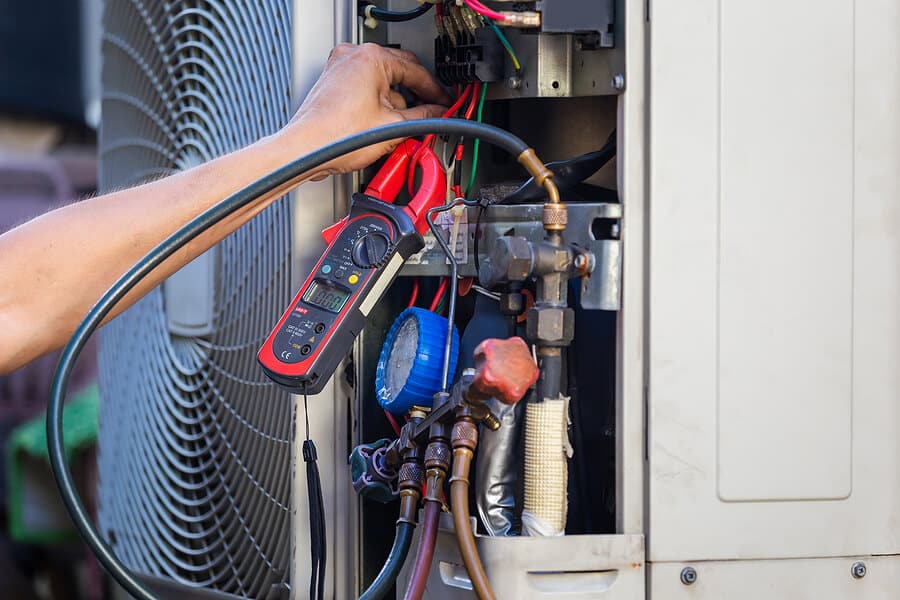Keep Your Home Comfortable Year-Round with DMAKS HVAC Support.
Keep Your Home Comfortable Year-Round with DMAKS HVAC Support.
Blog Article
Energy-Efficient A/c Equipments to Save Money On Energy Expenses
As energy prices continue to climb, the value of energy-efficient A/c systems becomes increasingly noticeable. These systems not just guarantee substantial savings on energy bills yet additionally add to a much more sustainable future by decreasing energy usage.
Benefits of Energy-Efficient A/c Systems
Energy-efficient Heating and cooling systems supply numerous advantages that prolong beyond simple price financial savings. By consuming less energy, these systems contribute to reduce greenhouse gas exhausts, aiding to battle environment adjustment and advertise sustainability.
In addition, energy-efficient HVAC systems usually provide enhanced comfort levels. Many of these systems feature advanced technology that permits better temperature control and improved air quality (DMAKS HVAC). This leads to a healthier interior setting, which is specifically vital for people with allergic reactions or breathing problems
Additionally, purchasing energy-efficient a/c systems can improve home value. As more consumers focus on power effectiveness, homes and structures furnished with these systems may attract greater quotes in the realty market.
Kinds of Energy-Efficient A/c Options
Just how can homeowners and companies pick one of the most suitable energy-efficient HVAC alternatives for their demands? The market offers a selection of energy-efficient a/c systems, each created to enhance convenience while lessening energy intake.
One choice is the variable refrigerant circulation (VRF) system, which efficiently regulates the temperature in numerous zones within a building. This system adjusts its refrigerant circulation to match the desired temperature level, resulting in substantial energy savings.
One more preferred option is geothermal heatpump, which use the planet's steady temperature level to heat and cool areas. By moving warm to and from the ground, these systems show outstanding performance, particularly in modest environments.
Additionally, ductless mini-split systems supply an energy-efficient alternative for homes lacking ductwork. These systems enable zone-specific heating and air conditioning, lowering energy waste in vacant locations.
Lastly, high-efficiency heating systems and ac unit, with advanced SEER and AFUE scores, supply dependable environment control while eating much less energy than standard versions. By evaluating these options, house owners and businesses can select a cooling and heating system customized to their specific requirements and energy effectiveness objectives.
Key Features to Think About

Next, check out the type of compressor made use of in the system. DMAKS HVAC. Variable-speed compressors can adjust their result to match the heating or cooling down need, causing boosted comfort and power savings contrasted to single-speed models. In addition, try to find systems equipped with wise thermostats that supply programmable settings and remote accessibility, permitting much better control over power consumption
Another vital web link function is the system's air filtering ability. High-efficiency filters can enhance interior air high quality and minimize energy consumption by making sure the system operates effectively. Take into consideration the kind of refrigerant used; modern-day systems typically employ eco-friendly cooling agents that have a reduced ecological impact.
Finally, make sure that the system works with zoning innovation, which enables for tailored temperature level control in various areas of your home, enhancing convenience while decreasing energy use.
Tips for Choosing the Right System


Following, consider power efficiency ratings, specifically the Seasonal Energy Effectiveness Ratio (SEER) for cooling down systems and the Annual Gas Use Effectiveness (AFUE) for heating systems. Greater rankings suggest greater performance, which can cause significant savings on energy bills with time.
In addition, assess the kind of HVAC system that ideal suits your way of living and budget plan. Options consist of air conditioning, ductless mini-splits, and warmth pumps, each with its own collection of advantages and downsides.
Don't forget the value of correct installation and sizing; an inaccurately sized system can result in inefficiencies and boosted wear. Consult with an expert HVAC specialist to get professional suggestions customized to your home's distinct demands. This thorough approach will make certain that you select an energy-efficient heating and cooling system that fulfills your demands and budget efficiently.
Upkeep for Optimum Efficiency
When the ideal cooling and heating system is in location, recurring upkeep becomes key to guaranteeing optimum performance and longevity. A well-maintained system runs better, leading to reduced energy intake and minimized utility expenses. Routine assessments and tune-ups need to be set up at the very least two times a year-- as soon as prior to the air a fantastic read conditioning period and as soon as prior to the home heating season.

Home owners must also be cautious about checking their heating and cooling system's efficiency. Unusual noises, rising and fall temperatures, or boosted power bills can suggest underlying issues that need instant focus. By dealing with these problems promptly, house owners can protect against costly repair services and expand the life-span of their systems.
Purchasing an upkeep strategy with a certified technician not only improves performance yet also offers satisfaction, recognizing that the system is running at its best. DMAKS HVAC. Regular maintenance is as a result important for maintaining power performance and reducing overall functional costs
Conclusion
In final thought, energy-efficient cooling and heating systems provide a feasible remedy for reducing utility bills while enhancing comfort and air quality. By incorporating advanced technologies and options such as geothermal heat pumps and ductless mini-splits, building proprietors can attain substantial power cost savings and add look what i found to environmental sustainability. Careful consideration of system features and recurring upkeep additionally makes sure ideal performance, making energy-efficient systems a prudent financial investment for both financial and environmental benefits.
Report this page